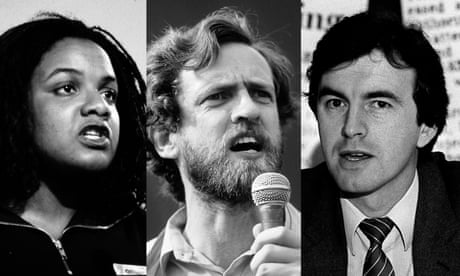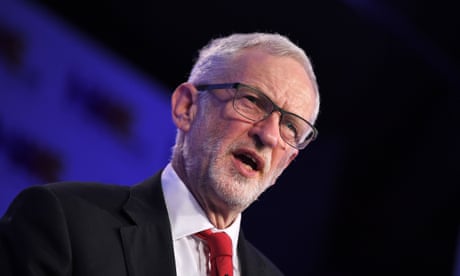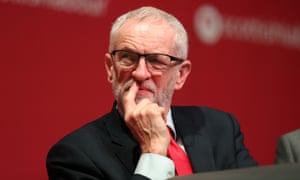Photograph: Andrew Milligan/PA
Jeremy Corbyn’s leadership is on borrowed time. That assumption has hung over it throughout his three and a half years in charge. It’s there during every Labour crisis. It’s there before every perilous election – such as the local polls this May. And after every bad or even so-so Labour result the end of Corbyn’s leadership is there in the minds of his many enemies, of many commentators, of many anxious Corbynistas.
When the party is doing better under him, such as during and immediately after the 2017 election, this sense that he is on perpetual probation recedes, but never completely and never for long. In June 2017, two days after Labour had won its largest general election vote since Tony Blair’s 1997 landslide, the then Labour MP Chris Leslie told BBC Radio 4’s Today programme: “We shouldn’t pretend that this is a famous victory. It is good … but it’s not going to be good enough.” Twenty months later, without waiting to see if his scepticism about Corbynism’s electoral potential was justified, he left the party to co-found the Independent Group.
Some of the temporary, besieged feel of the current Labour regime is down to Corbyn himself: his initial reluctance to fill Labour’s leadership vacuum, his relative lack of conventional political skills, his advanced age for a modern British party leader. He will turn 70 in May, shortly after the local elections, which will be handy for his political obituarists if Labour does as poorly as polls currently suggest.
Jeremy Corbyn’s leadership is on borrowed time. That assumption has hung over it throughout his three and a half years in charge. It’s there during every Labour crisis. It’s there before every perilous election – such as the local polls this May. And after every bad or even so-so Labour result the end of Corbyn’s leadership is there in the minds of his many enemies, of many commentators, of many anxious Corbynistas.
When the party is doing better under him, such as during and immediately after the 2017 election, this sense that he is on perpetual probation recedes, but never completely and never for long. In June 2017, two days after Labour had won its largest general election vote since Tony Blair’s 1997 landslide, the then Labour MP Chris Leslie told BBC Radio 4’s Today programme: “We shouldn’t pretend that this is a famous victory. It is good … but it’s not going to be good enough.” Twenty months later, without waiting to see if his scepticism about Corbynism’s electoral potential was justified, he left the party to co-found the Independent Group.
Some of the temporary, besieged feel of the current Labour regime is down to Corbyn himself: his initial reluctance to fill Labour’s leadership vacuum, his relative lack of conventional political skills, his advanced age for a modern British party leader. He will turn 70 in May, shortly after the local elections, which will be handy for his political obituarists if Labour does as poorly as polls currently suggest.

The wilderness years: how Labour’s left survived to conquer
Yet the unforgiving standards by which he is judged are also applied to the Labour left as a whole. Despite Corbyn’s two enormous democratic mandates, the left is endlessly said to have “taken over” the party; to be a “sect”, a “cult”, an alien “virus”. The language has become so commonplace, it is rarely pointed out how loaded it is. The Labour left has been othered.
Many people in the rest of the party, and wider British politics and the media, don’t consider the left to be a legitimate Labour tribe, let alone legitimate rulers of the party, let alone a legitimate potential government. This is rarely stated explicitly. Excluding a large and currently vibrant group from mainstream politics can be an awkward argument to make in a democracy – especially when the radical right of the Conservative party has never been othered in the same way. Instead, starting with Margaret Thatcher, it has often run the country. But once you appreciate the implacable hostility the Labour left arouses, it explains a lot of otherwise puzzling British political phenomena.
In recent weeks, MPs at a meeting of the parliamentary Labour party have reportedly applauded the Independent Group breakaway, despite the immense damage it has done to the chances of a Labour government. Tom Watson, in theory Corbyn’s loyal deputy, has said things that could end up on Tory election posters, such as “I love this [Labour] party but sometimes I no longer recognise it.” He has also set up the Future Britain group, scheduled to meet for the first time on Monday night , for “social democratic” Labour MPs to assert themselves against “doctrinaire utopianism”, which sounds like none-to-subtle code for the left.
Meanwhile, as ever, seasoned political journalists, who spent decades tolerating the dark arts of Alastair Campbell and New Labour’s other arm-twisters, have declared themselves horrified at the “bullying” of opponents by Corbynistas. Tom Bower, biographer of Gordon Brown and a dozen other bruisers, gives his current book on Corbyn the subtitle Corbyn’s Ruthless Plot for Power. Corbyn supporters may be tempted to reply: we should be so lucky.
Despite, or, rather, partly because of, all the panics about the Labour left, it has rarely been dominant in the party. The last leftwing leader before Corbyn was George Lansbury, in the 1930s, another relatively elderly London radical, who lasted three years before being forced to resign by more centrist figures who did not like his pacifism. The fact that Labour’s leader in the early 1980s, Michael Foot, is also often regarded as a leftwinger, when he actually spent much of his tenure frustrating and arguing with the left, and its key player Tony Benn in particular, is a sign of how exaggerated the conventional picture of the Labour left’s strength can be.
“Labour leaders tremble at the relentless advance of Benn’s army,” warned the Express in May 1981, after Benn launched his famous bid for the party’s deputy leadership. And yet, in large part because the press othered him so effectively, as a kind of foreign demagogue – “Ayatollah Benn”, according to the Sun, after Iran’s revolutionary leader, Ayatollah Khomeini – he did not win.

Poverty and climate more important than Brexit, says Corbyn
Labour centrists often talk about the need for the party to be “a broad church”. Rather less often, they accept that control of it ought to alternate between its different tribes, in a roughly representative way. Eight years ago David Owen, the former Labour minister and SDP co-founder, told the New Statesman that after the defeat of Jim Callaghan’s centrist government (in which Owen served) at the 1979 general election: “It was not unreasonable for those on the left to try to shift the balance of power in the party closer to their views.”
But back in the 80s Owen was rather less willing to let the left have its turn. He co-founded the SDP partly to block it. The SDP’s founding document, the 1981 Limehouse declaration, which he helped draw up, denounced “the drift towards extremism in the Labour party”, supposedly being led by Benn, as “not compatible” with the party’s “democratic traditions”. Last month, at the launch of the Independent Group, Leslie caricatured Corbynism in almost exactly the same way. Labour, he said, had been “hijacked” by “the hard left”.
Does it matter that so many people don’t want British politics to include a left of any significance? Even if you’re not at all leftwing, recent British history suggests it does. Between the fading of Benn’s influence in the mid-80s and Corbyn’s leadership win in 2015, the Labour parliamentary left – effectively the entire Commons left – dwindled to a few dozen MPs, occasionally admired, more often patronised and derided, almost always marginal to the making of government policy. Meanwhile more mainstream, supposedly more realistic politicians gave us Thatcherism, frequently disastrous wars, the financial crisis, austerity, and an increasingly dysfunctional version of free-market capitalism.
Now that we are living with the aftermath of all that – with a Conservative right promising further destructive experiments; and a Labour centre-left that has come up with almost no fresh ideas since the heyday of Blairism, two decades ago – it seems an odd time to decide that British politics can do without a leftwing alternative. Corbyn’s Labour project is rickety, incomplete and overambitious. It may be easier to concentrate on its flaws and scandals than to evaluate its policies, and then decide whether any of them are solutions to the country’s multiple crises. But if Britain could, somehow, finally, stop questioning whether the Labour left belongs in mainstream politics, it may even discover that the left has things to offer.

No comments:
Post a Comment